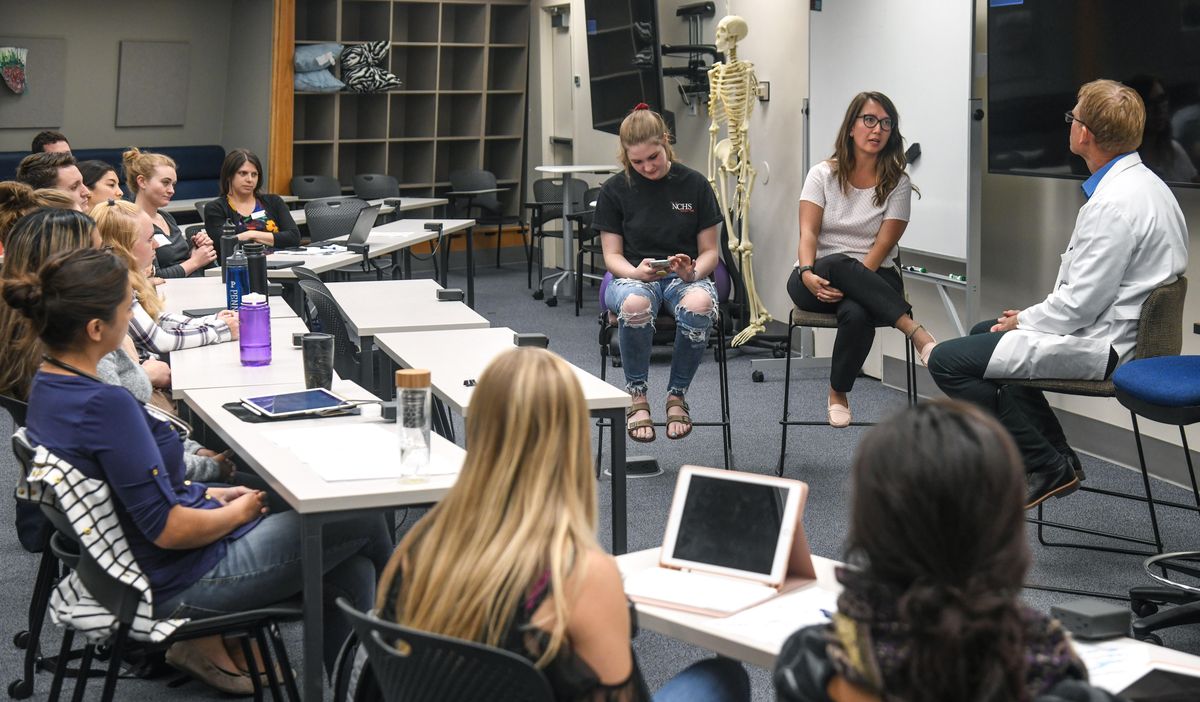North Central High actors help UW-Spokane medical school identify ways to communicate with patients

While a doctor asked her questions, teenager Anne Lewis alternated between shrugs and frequent glances at her cellphone.
“I don’t know” and “maybe” were typical answers when asked if she had withdrawn from her normal activities, although Dr. Clint Hauxwell asked the question in different ways. Sitting beside Lewis, 17, was Leah Dach, “mom.”
But a separate doctor’s appointment went more smoothly with Porter Lawrence, 17, when he and Hauxwell had some time alone. The teen slowly opened up more about issues after he’d put his phone away and a parent briefly left the room.
Lewis and Lawrence are actually part of North Central High School’s drama program, and Dach is their teacher. The three recently performed different scenarios for first-year medical students at the University of Washington School of Medicine in Spokane.
The role-playing workshops with Hauxwell, the medical students’ instructor, showed different ways to handle such adolescent appointments for better patient interactions. The acted-out scenario was an appointment the mom had scheduled because of possible signs of depression in the teen.
After each session, he asked the medical students what they thought went well – and what didn’t.
“Broad, open-ended questions don’t work really well, but you don’t want to use closed-ended questions,” said Hauxwell, a Spokane family physician who also is a UW assistant professor.
“There is a happy medium when you’re talking to adolescents to get information, and, as you noticed, frequently you have to ask the same question multiple different ways.”
This is the fifth year Hauxwell has collaborated with North Central drama in his teaching. Each fall, the acted-out scenarios help Hauxwell show future doctors better communication tools with patients that hinge on different stages in life, such as small children, teens and the elderly.
Hauxwell knows the medical students will notice intricacies regarding how he handles each of the interactions with the drama students.
After a workshop earlier this month, the UW students brought up how Hauxwell briefly asked both the teen’s and parent’s perspective of health issues. But in Lawrence’s case, the doctor then asked the “parent” to leave the exam room so that the patient and doctor could talk.
Hauxwell hadn’t worn his white doctor’s coat for the second session and politely requested the teen to put away his phone so they “can have a better chat.” Also with Lawrence, Hauxwell said he always asks all of his teenage patients certain health questions, to normalize them, regarding use of alcohol, drugs and sexuality.
Students also noticed a few missing pieces, and Hauxwell expected that.
“When the mom left, you didn’t say much about confidentiality,” said one student. To which Hauxwell answered, “You’re right; I should have told him that everything he told me, with the exception of harm to himself or others, is confidential.”
Lewis, Lawrence and Dach went to the Schoenberg Center at Gonzaga University for two workshops, a week apart, to do the brief role playing before 30 medical students in each classroom session.
“The medical school revised its curriculum five years ago, and that’s when I was hired on as faculty,” Hauxwell said. “At the time, one of my good friends was the drama teacher at North Central, Tom Armitage.”
When Hauxwell asked Armitage, who has since retired, if he thought drama students could help bring more real-life patient interaction examples into classes, his friend quickly agreed.
Typically, two NC drama students each year have participated with their teacher. There isn’t a script, but the NC students know about the appointment’s scenario and briefly practice it with Hauxwell in his Schoenberg office for about 20 minutes before going into the classroom.
“It’s practicing interacting with patients,” Hauxwell said. “For the new medical students, we call it ‘Care Across the Life Cycle.’ The first few weeks, we teach them how to do an exam. So this workshop emphasizes there are differences in the way we interact with little kids, the elderly, as well as adolescents.”
“We also have some elderly people who come in and talk to students,” he added. “My thought for teens was what better way to illustrate that than to have adolescents come into the classroom.”
In role playing the clinical visit, both times the doctor started off asking about summer activities and other small talk. He brought up that “mom” had requested the appointment because of concerns about her child seeming more withdrawn and less interested in normal activities.
“He hasn’t been himself probably for about six months,” Dach said for the scenario with Lawrence. “He hasn’t wanted to go out with friends, and he hasn’t been doing some of the activities he used to like to do.”
The doctor’s typical line of questioning sought to find answers to different stresses that might stem from problems at school, home, among friends or in dating. Both times, the appointment scenario wrapped up with the physician encouraging a referral to see a counselor at the clinic.
Talking to the UW students, Hauxwell said such adolescent patient interactions should cover issues regarding home life, education, activities, drugs or substance use, sexual activity and safety.
Lawrence, who is interested in college theater, said the UW workshops offer a way to act almost in an improv fashion. He was surprised by how much detail the future doctors notice in each scenario.
“This is definitely different than having a cold script and months of preparation before a play,” he said.
“This is based on real stuff and teaching medical students how a doctor’s appointment should go with an adolescent. It’s interesting how much the medical students are focused and notice details, down to whether the doctor is wearing a coat or not.”